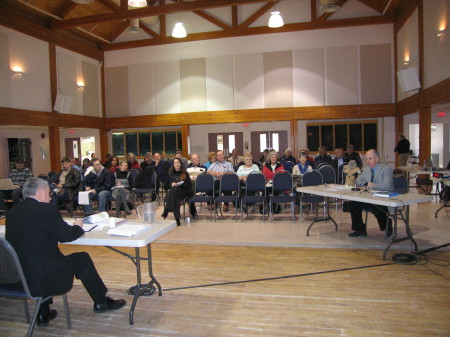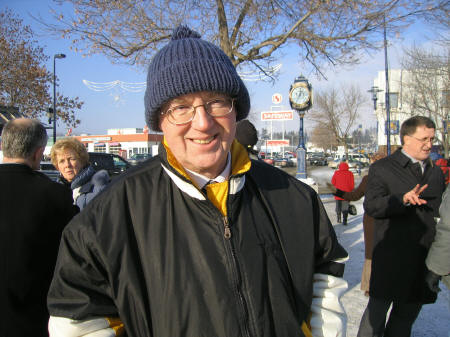Only Hearing In North On Electoral Boundaries Is Over

Cariboo North MLA Bob Simpson goes before the Commission at the Quesnel Seniors Centre
Quesnel, B.C. - They came to urge the B.C. Electoral Boundaries Commission to, at the very least, maintain the status quo in northern ridings...
The commission has proposed a reduction of three MLAs in northern and other rural areas of the province and an increase of five MLAs in the Okanagan and Lower Mainland.
Speaker after speaker went before the three-member panel during a public hearing at the Senior’s Activity Centre in Quesnel this afternoon to plead for recognition of the special circumstances the vast geography of this area creates. And with Quesnel the only stop in the northern half of the province during this last-round of hearings, many had to travel a great distance to be heard.

Terrace Mayor, Jack Talstra, attended a pre-hearing rally before going before the commission in his capacity as Chair of the Regional District of Kitimat-Stikine.
"Our message really is that in the northwest -- as it is for all northerners -- we’re going to lose representation by dropping down from 8 MLAs to 7."
"We don’t want to see that happen," he says, "We need effective representation that’s something different in some ways than merely population-representation, it also includes geography, of which we have a vast amount of."
Talstra adds, "We have a lot of trouble having our voice heard in the south, in Victoria, this will just dilute our voice, so it’s important we do something about that."
Speaking on behalf of the North Central Municipal Association, Quesnel Councillor Mary Sjostrom, says, "The recommendations you will make in February could have very long-lasting effects in our region." Sjostrom adds, "This is not about drawing lines on a map -- it’s about fair and effective representation."
Merlin Nichols travelled from Chetwynd, north of Prince George, to outline proposed boundary realignments that would see that small community pushed to the outer edge of the riding. He, too, expresses concern elected officials just won’t be able to adequately cover and meet the needs of their constituents.
Quesnel and District Labour Council President, Victor Johnson, says he went before the commission to speak on behalf of the average citizen in these ridings, "The larger the riding, the less effective the representation."
Residents wanting to make a written submission to the commission just have until tomorrow to do so, more information is available at the website: www.bc-ebc.ca
Previous Story - Next Story
Return to Home










An issue or bill would then need to be agreed upon by MLAs in both chambers, forcing the densely and sparsely populated areas to accommodate each other's interests.